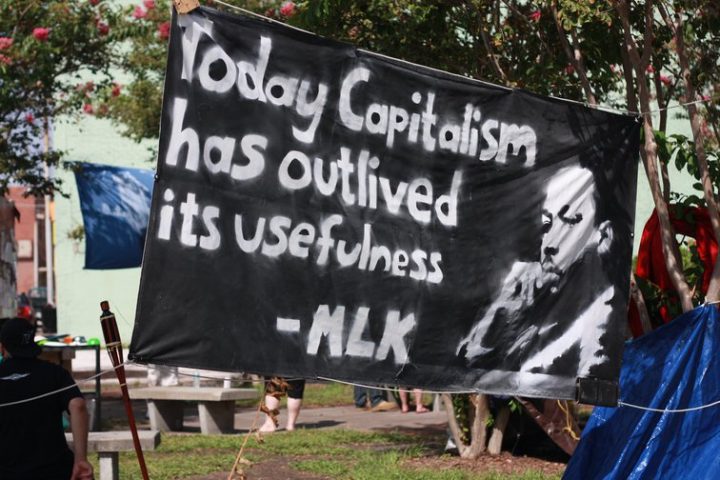At an international conference in New York City, a new group of scholars is studying alternatives to capitalism.
In an historical moment when governments and citizens around the world are called on to take action to face multiple crises in the environment, the economy and society, research into alternatives to capitalism has begun to flourish. While the study of capitalism is all but a new phenomenon – passing from Karl Marx to the Frankfurt School and contemporary thinkers like Wolfgang Streeck and Ellen Wood – what is unique in the scholarship produced in the last decade is the effort to envision alternatives to it, given the increasing awareness that contemporary capitalism is inherently unsustainable.
The literature on degrowth, for instance, is focused on downscaling production and consumption that could increase, according to its promoters, the well-being of all and help sustain the natural basis of life. The scholarly debate on degrowth has been accompanied by a growing transnational movement.
Another strand of literature that has gained prominence in the last years emanates from the research group on Post-Growth societies at the University Friedrich-Schiller in Jena (Germany). Among the scholars based there, Harmut Rosa has developed the concept of capitalist “acceleration” and the ways in which “resonance” can help reshape our relationship to the world.
Arguably the most influential contribution to the debate on alternatives to capitalism has been the late Erik Olin Wright’s book “Envisioning Real Utopias” in which he outlined different strategies for overcoming contemporary capitalism. These have been further developed in the just-published book, “How to Be an Anticapitalist in the 21st Century”.
Finally, one of Nancy Fraser’s latest books, “Capitalism. A Conversation in Critical Theory”, builds a critical theory of capitalism and identifies in progressive populism the way to overcome contemporary financialized capitalism.
Building an International and Interdisciplinary Research Community
In 2015, at the annual meeting of the Society for the Advancement of Socio-Economics (SASE) held at the London School of Economics in London, interest in the future of capitalism was first raised during a roundtable discussion with Wolfgang Streeck, Craig Calhoun, Polly Toynbee and Amitai Etzioni. The following year, the conference was hosted by the University of California, Berkeley, where we launched a new thematic sub-stream, titled “Re-Embedding the Social: Cooperatives, Political Consumerism and Alternative Ways of Living.”
The conference in California turned out to be a platform able to gather a wide-ranging community of scholars (economists, political scientists, sociologists, historians, anthropologists, organizational and management scholars) who were all grappling with the same, big, overarching question: How to envision and enact alternatives to contemporary capitalism? In 2017, we therefore decided to establish, together with two colleagues from the United States, a permanent international and interdisciplinary research network within SASE dedicated to the study of alternatives to capitalism.
Envisioning and Enacting Alternatives
The research in our network spans three of the four strategies of resistance identified and conceptualized by the late Erik Olin Wright, each of which differ according to their goal and their primary target. Taming capitalism involves subjecting capitalism to significant regulation and redistribution to counteract its harms while still generating adequate profits for it to function. This strategy was used to great effect by social democratic political parties in the post-war period, but was largely abandoned during the ascendancy and dominance of neoliberalism over the past four decades. There is however now plenty of evidence that this strategy is experiencing a resurgence in the United States and the United Kingdom, most vividly evidenced by the rise of Jeremy Corbyn, Bernie Sanders and Alexandria Ocasio-Cortez.
In contrast, escaping capitalism deems the system too powerful to destroy and asserts that the best we can do is to try insulate ourselves from it. Indeed, all around the world intentional communities and eco-villages are increasingly being established which experiment with more collective, democratic, egalitarian and sustainable ways of living that could potentially be scaled up.
Finally, eroding capitalism involves building more democratic and egalitarian economic institutions in the hope that they will expand to the point where capitalism is displaced as the dominant way of organising the production and distribution of goods and services. This includes worker, producer or consumer cooperatives (private businesses that are democratically owned and controlled by the people who produce their products or use their services), grassroots innovations and bottom-up initiatives. Combining all three of these strategies simultaneously is arguably where the greatest transformative potential lies.
Extending the Frontiers of Capitalism Studies
This year’s gathering of our network is taking place in New York at The New School for Social Research with scholars from all around the world organized in twenty-six panels across three tracks (“Capitalism and its Alternatives: Contemporary Debates”; “Democratic Workplaces, Cooperatives and the Commons”; and “Transformative Innovations and Social Movements”). The next step in the study of capitalism entails moving beyond the envisioning of alternatives and requires delving into the paradoxes, contradictions and tensions that arise in the challenging process of their implementation.
In the words of Immanuel Wallersteinreflecting on the history of capitalism: “Are there other possibilities? Of course there are … The human social world is still very young in cosmological time. In 2050 or 2100, when we look back at capitalist civilization, what will we see?”










